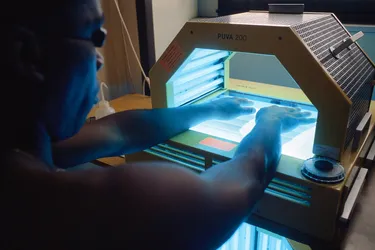The redness, discoloration, dryness, and itch of atopic dermatitis (AD) could send you to your dermatologist in search of solutions. Your doctor will start by taking stock of your symptoms.
“The first thing is assessing disease severity,” says Lindsay Strowd, MD, an associate professor of dermatology and vice chair of the Department of Dermatology at Wake Forest Baptist Health.
Doctors figure out how severe your AD is by the amount of your body surface that’s affected. The more areas of inflamed skin you have, the more severe your condition. They also look at the area of your body where AD is located. Plus, severe AD also tends to be deeper red in color, Strowd says. But for some with darker skin, the skin may look discolored rather than red. It may even end up lighter in color after the acute inflammation goes away. Your skin may be thicker than normal and break open when you scratch it a lot.
Another sign that you need more intense treatment is that topical medicines haven’t controlled the redness, discoloration, and itch. AD itch can be intense enough to interfere with your sleep and work. Your doctor will ask how much you’re itching and how AD affects your daily life. “Those components will guide our treatment choices,” Strowd says.
Creams and Phototherapy
A topical treatment might be enough to treat a mild case of AD. Coal tar has been used for more than 100 years to treat AD and other skin conditions. Steroid creams help control the itch and give your skin a chance to heal. Calcineurin inhibitors like pimecrolimus (Elidel) and tacrolimus (Protopic) reduce the immune response to bring down inflammation in your skin.
A newer type of topical treatment is crisaborole (Eucrisa). This ointment helps ease inflammation, itching, and rashes in people age 2 and older.
A group of new medications called Janus kinase (JAK) inhibitors have been approved for AD. They block a pathway that leads to the release of inflammatory chemicals in the body. Ruxolitinib (Opzelura) is available as a cream.
Phototherapy, also called light therapy, is an option if you have AD on large areas of your body. Your dermatologist might also recommend this treatment for patches in places like your hands and feet that don’t improve with topical treatments. Phototherapy uses ultraviolet (UV) light to help clear your skin.
If you have severe AD or your skin doesn’t improve on these treatments, it could be time to think about more body-wide or advanced therapies.
Body-Wide Treatments
Systemic drugs work throughout your body to treat larger areas of AD. Dermatologists use a few medicines off-label, which means they’re approved to treat other conditions but they also work on AD.
One body-wide treatment is cyclosporine, which suppresses your overactive immune system response. “That’s a very potent drug that cuts down on inflammation in the skin,” says Jon Hanifin, MD, a professor emeritus of dermatology at the Oregon Health and Science University School of Medicine.
Other drugs that work in a similar way include:
- Azathioprine (Azasan, Imuran)
- Methotrexate (Rheumatrex, Trexall)
- Mycophenolate mofetil (CellCept)
One downside to these treatments is they can cause serious side effects, including:
- Kidney or liver damage
- High blood pressure
- Shaking (tremor)
- Muscle pain
- Electrolyte imbalances
Newer Ways to Treat Moderate to Severe AD
In 2017, the FDA approved the first biologic drug for AD, called dupilumab (Dupixent). It treats moderate to severe AD in adults and children ages 6 and older.
Dupixent comes as a shot you get under the skin once every 2 weeks. It works by blocking two proteins that cause inflammation in AD: interleukin-4 (IL-4) and interleukin-13 (IL-13).
“If you think of the skin as being on fire, a medication like methotrexate or prednisone [a steroid] act like a fire blanket. It smothers out the fire,” Strowd says. “Whereas a medicine like Dupixent is like taking a fire extinguisher and shooting the source of the fire. It’s a much more specific target.”
In studies, Dupixent cleared the skin, relieved itching, and improved quality of life in people with AD. More than half of those who took it for 16 weeks said they had 75% fewer symptoms. Those improvements last long-term.
Strowd calls Dupixent “a real game-changer.” “It has been very successful at causing rapid improvement, both in the skin disease and in the itch,” she says. (Strowd took part in clinical trials for Dupixent.)
Dupixent is also safe. The most common side effects are mild, including:
- Skin reactions where you got the shot
- Cold sores on the mouth or lips
- Eye and eyelid redness, swelling, and itching
- Pinkeye
One downside to Dupixent is its cost, which is more than $3,200 per shot. How much you actually pay depends on the type of health insurance you have. Your insurance company may want you to try less expensive drugs first before it will cover the cost of Dupixent, Hanifin says.
Another biologic, tralokinumab-ldrm (Adbry), was approved by the FDA in December 2021 for adults age 17 and older. It’s also an interleukin inhibitor that blocks IL-13. You take it as a shot every other week. The side effects are similar to those for Dupixent. The cost is similar, too, so you’ll need to check your insurance coverage to see if it’s covered for you.
Some JAK inhibitors can be taken as pills, which could be a plus if you don’t like needles. They include the medications abrocitinib (Cibinqo) and upadacitinib (Rinvoq).
Life-Changing Treatments
New treatments like Dupixent have improved the outlook for people with AD. They’ve made it possible for many people with this condition to have skin that’s clear or almost clear.
“It absolutely changes people’s lives when they have been suffering,” Strowd says. “It’s a very rewarding part of treating this disease in our modern era.”

